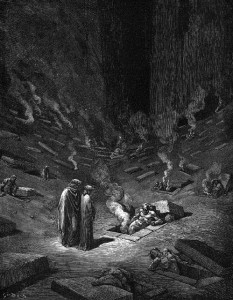 Dear Father John, Do you have to know you are committing a sin in order to actually commit one?
Dear Father John, Do you have to know you are committing a sin in order to actually commit one?
You would think this simple question has a simple answer. But it doesn’t. We have to get a little theological here to unravel it, but I’ll try to be brief anyhow.
First of all, we have to remember what sin is. Sin is rebellion against God. It is saying to God, “I don’t want to do what you want me to do.” (For more on the nature of sin, you can you see the posts in our Series on Scrupulosity) Right away, then, we can see that every sin has two poles.
Evil Effects Follow Evil Actions
In the first place, there is the action itself. As human beings, our actions can be conscious thoughts, words, or deeds. (Digesting lunch isn’t really a human action, because we don’t do it consciously). So a sin is, in the first place, a (conscious) thought, word, or deed that goes against God’s will. Now, we know that God’s will is as full of wisdom as the ocean is full of water (see Psalm 36:6). And his wisdom is intrinsically connected to his limitless love, his overflowing goodness, and his absolute omnipotence. To go against his will, then, is not a smart thing to do. It’s like going against the manufacturer’s instructions – like putting sand in the gas tank of our car, or drying out a wet cell phone by putting it in a hot oven for a couple of hours. It does damage.
It’s important to have that clear. Any thought, word, or action that goes against God’s will (that violates the natural moral law, the Ten Commandments, the teachings of his Church…) will cause some kind of damage to one’s own person, and to the world around us. We may not always see it right away, but it is there, and it will show up, sooner or later. God doesn’t make up a random list of sins out of thin air. Disobedience to God is disobedience to God’s wise plan for human life, for our life; it’s trying to fly without wings. To describe this first aspect of sin, we can use the term “evil action.”
To Blame or Not To Blame
In the second place, sin involves the conscious choice to perform such a rebellious action. This is why, for example, someone who is driving drunk and causes a fatal accident is not necessarily guilty of the sin of murder (they didn’t consciously intend to kill), but they are guilty of the sin of drunkenness (they chose to abuse alcohol). This is also why a criminal who forces a banker at gunpoint to unlock a safe doesn’t make the banker guilty of the sin of theft – the banker opened the safe against his will. Where there is no free choice, there can be no moral responsibility.
But our distinctions don’t end there. The conscious choice to perform an evil action can itself be culpable or not culpable. In other words, we can be responsible for the evil choice or not responsible for it. If I am responsible for it, then I become morally guilty for the evil committed and its consequences. If I am not responsible for it, then I am morally innocent.
For example, if a little boy grows up with parents who are thieves and who teach him to follow in their footsteps, that child may grow up convinced that stealing from non-family members is not an evil action. In that case, whenever he steals from non-family members, although he is freely committing an objectively evil action, he is not aware that it is evil (he doesn’t know that it is a sin). So, the damage is done, both to his soul (he deepens his habits of deception and dishonesty) and to the world around him (the pain and suffering caused by injustice), but he is not morally culpable for it – not guilty.
On the other hand, if a little boy grows up in a normal family environment, his natural, God-given sense of right and wrong will be nourished by the words and example of his parents and education. In this case, he will know that he shouldn’t take anything that doesn’t belong to him. And so, when he goes off to summer camp for the first time and discovers that his roommate has a collection of candy bars, he knows that taking one of them without permission is an evil action. And so, if he takes one anyway, he is responsible for the evil – guilty.
The Hazy Days of Sinners
This all seems obvious. But in real life the line between culpability and non-culpability often gets hazy. As the first little boy grows up, for example, at some point he will realize that other people don’t live like thieves. At some point his natural, God-given sense of right and wrong will flash a thought into his mind: “What is this person going to do if I steal their credit card and max it out at the cash machine?” It may be a very quiet qualm of conscience, but at some point, unless he has become psychopathic or sociopathic, the qualm will surface. At that point, doesn’t he become culpable, even though he had such a twisted upbringing?
A classic example of this haziness in the realm of moral responsibility is the case of the guards in charge of exterminating prisoners during the Nazi holocaust. Was it truly possible that they didn’t realize, at some level of consciousness, that they were destroying fellow human beings? Are the guards morally innocent because they were simply following orders?… When we start to wrestle with tangled cases like that, it is relief to remember that God is the perfect judge.
Here is an example of haziness (uncertainty about what’s right or wrong in a specific situation) that’s a little closer to home. Imagine that the government makes a mistake in my favor and sends me an extra $1000 on a tax rebate. That money really doesn’t belong to me, which means it belongs to someone else. So, shouldn’t I send it back to the government? But wait, doesn’t the government charge too much money in taxes anyway, and wasn’t it their mistake? Is taking that extra rebate (which I may really need) stealing? Some good Catholics would keep that money without batting an eye, thanking God for it. Others would send it back immediately, convinced that it was a temptation from the Devil. On rare occasions, then, knowing right and wrong is tricky business, business that keeps moral theologians busy.
Getting Down to Brass Tacks
Now we are ready to answer your question. To be guilty of an evil action, I must be aware that it is evil, that it is morally wrong. That awareness may be clear or fuzzy. The clearer it is, the more guilty I am. To be guilty of an evil action, I also have to freely make the evil choice. The greater the degree of freedom, the great the culpability. If I commit an evil action without awareness of the evil or when my freedom is impaired, however, the evil is still committed; damage is done. This is why ignorance is NOT bliss. Fornication still wounds souls and societies, even if the fornicators have never been taught that fornication is wrong.
The spiritual consequences of this long answer to your very short question are pretty obvious. We need to make a decent effort not only to do what’s good and avoid what’s evil, but also, to know what’s right and wrong – it’s much easier to walk quickly and surely in the daylight than in the dark. We have to inform ourselves about what the Church teaches and why, going beyond the Google News sound bites about the Pope’s latest encyclical. That’s why you are reading this, and that’s why faithful Catholic resources like www.ncregister.com and www.faithandfamilylive.com (Catholic Digest) are so invaluable to us.
Yours in Christ, Father John Bartunek, LC





